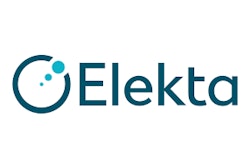Radiation oncology firm Elekta is highlighting research presented at the recent American Society for Radiation Oncology (ASTRO) conference in Boston on the use of the company's work-in-progress high-field MR-adaptive linear accelerator (MR-linac) for radiation therapy.
The company's MR-linac was featured in a range of studies:
- Dr. Christopher Schultz of the Medical College of Wisconsin in Milwaukee and colleagues explored strategies for integrating MR-linac into current radiation therapy protocols.
- Bas Raaymakers, PhD, of University Medical Center Utrecht in the Netherlands and colleagues highlighted the potential to use MR-linac technology from pretreatment planning to treatment.
- Phil Prior, PhD, of the Medical College of Wisconsin and colleagues explored whether using MR-linac would improve targeting and lower radiation dose to normal breast tissue in women undergoing preoperative partial breast irradiation.
- Dr. Hannah Bainbridge of the Royal Marsden NHS Foundation Trust in Sutton, U.K., and colleagues studied clinically acceptable treatment plans for patients with locally advanced non-small cell lung cancer.
- Ozgur Ates, PhD, of the Medical College of Wisconsin and colleagues explored whether online adaptive treatment replanning is feasible for prostate cancer radiation therapy.
Elekta's MR-linac combines a linear accelerator and a 1.5-tesla MR system, allowing for radiation therapy delivery and high-field MR tumor monitoring at the same time, the company said.



.fFmgij6Hin.png?auto=compress%2Cformat&fit=crop&h=100&q=70&w=100)




.fFmgij6Hin.png?auto=compress%2Cformat&fit=crop&h=167&q=70&w=250)











